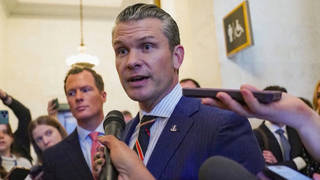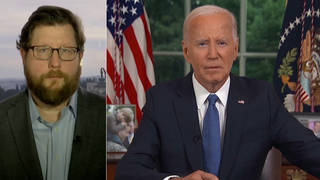HeadlinesSeptember 10, 2014
Obama Claims Existing Authority to Expand Strikes on Islamic State to Syria
The White House is asserting President Obama already has authority for the expanded military campaign against the Islamic State he has asked Congress to approve. The message was delivered to lawmakers ahead of Obama’s address to the nation tonight. Obama is expected to outline his strategy for what the White House calls “degrading and ultimately destroying the terrorist group.” Leaked details forecast a long-term campaign that will extend U.S. airstrikes from Iraq to Syria, where ISIS has established a foothold battling Syrian President Bashar al-Assad. Obama’s calculations are said to include how to intervene without aiding the Assad regime. Speaking to reporters, White House Press Secretary Josh Earnest said Obama’s plan is informed by the mistakes of the Iraq War.
Josh Earnest: “You know, the president is very interested in communicating clearly with the American public about what our priorities are and what our plans include, and what our plans don’t include. And it’s important to note that the president, as much as anyone else, has certainly learned the lessons that are evident from previous military activities in Iraq. Specifically those are that the United States cannot — again, at least it does not serve our interest to put the United States in a position in which we are bearing the load of the responsibility for providing security in the nation of Iraq.”
Although Obama has asked Congress to vote on the authorization of force he says he already has, it’s unclear if enough lawmakers want the opportunity. Speaking to The New York Times, Republican Rep. Jack Kingston, who supports an authorization vote, said: “A lot of people would like to stay on the sideline and say, 'Just bomb the place and tell us about it later.' It’s an election year. A lot of Democrats don’t know how it would play in their party, and Republicans don’t want to change anything. We like the path we’re on now. We can denounce it if it goes bad, and praise it if it goes well and ask what took him so long.”
Syrian Rebel Leader Among 45 Killed in Blast
President Obama’s plan to confront the Islamic State also includes new military equipment and training for Syrian rebels not aligned with ISIS. In a setback for that group, a top leader of the Ahrar al-Sham rebel organization, Hassan Abboud, has died in a bombing attack in Idlib that killed at least 45 people, including several top commanders.
Brown Wins GOP Senate Primary in NH; Cuomo Survives Primary Challenges in NY
The last of the 2014 primaries were held in five Northeast states Tuesday ahead of the approaching midterm elections. In New Hampshire, Scott Brown won the Republican primary to challenge Democratic Sen. Jeanne Shaheen. Brown previously served as a senator for Massachusetts until losing his seat in 2012. The Brown-Shaheen contest is seen as one of the key races deciding which party controls the Senate for the last two years of President Obama’s term. In the night’s biggest upset, Iraq War veteran and political newcomer Seth Moulton defeated nine-term Democratic Rep. John Tierney in Massachusetts. In New York, Democratic Gov. Andrew Cuomo won the Democratic nomination, defeating his main challenger, Zephyr Teachout. With more than 35 percent of the vote, The New York Times says Teachout posted the strongest challenge to an incumbent governor since the state’s primaries began in 1970.
Ferguson Residents Pack City Council Meeting with Calls for Change
Residents of the town of Ferguson, Missouri, packed a city council meeting last night, the first since last month’s police killing of 18-year-old African American Michael Brown. The City Council unveiled reforms that have stemmed from activist demands, including a citizen review board for police, a cap on how much of city revenue can come from fines, and a one-month recall program for warrants. But a number of residents voiced criticism that the reforms do not go far enough, calling for the resignation of top officials and the arrest of the officer who shot Brown, Darren Wilson. Over the course of the night, many who rose to speak gave their name simply as “Mike Brown.”
Senate Holds Hearing on Police Militarization in Ferguson Aftermath
The city council meeting in Ferguson came as the Senate held a hearing on the militarization of police forces nationwide. Democratic Sen. Claire McCaskill of Missouri said the hearing was prompted by concerns over the heavily armed crackdown on the Ferguson protests following Michael Brown’s death.
Sen. Claire McCaskill: “I saw armored vehicles with a sniper pointing a rifle at an unarmed protester on a warm summer afternoon. I think most Americans were uncomfortable watching a suburban street in St. Louis being transformed, with vivid images, powerful images across this country, into a war zone, complete with camouflage, tear gas, rubber bullets, armored vehicles and laser sights.”
The Pentagon’s 1033 program has transferred more than $5.1 billion in military equipment to local agencies since 1991, including some 600 Mine-Resistant Armor-Protected vehicles, or MRAPs. Speaking in defense of the program, Brian Kamoie of the Department of Homeland Security said military equipment helped locate the surviving suspect after the Boston Marathon bombing last year.
Brian Kamoie: “The response to the 2013 Boston Marathon bombing demonstrated how preparedness grant investments have improved capabilities. Grant-funded equipment such as the forward-looking infrared camera on a Massachusetts State Police helicopter enabled the apprehension of Dzhokhar Tsarnaev, while enhancing the personal safety of law enforcement officers and protecting public safety.”
In a statement, the American Civil Liberties Union says it plans to deliver a petition calling on the government to “stop funding the militarized policing of communities of color.” Kara Dansky of the ACLU said the Pentagon transfers fuel police crackdowns in low-income, majority black communities like Ferguson.
Kara Dansky: “I think one net result is that having all this equipment at the disposal of local law enforcement is that it contributes to the culture of militarism that we’ve seen in law enforcement, again, for several decades, particularly in poor communities and communities of color. I think we need to be very concerned that it’s not quite as though all Americans experience the militarization of policing equally.”
President Obama ordered a review of military transfers to local police forces in the aftermath of Brown’s killing. The Justice Department is also carrying out a civil rights probe of the Ferguson police force.
Questioned on Assault Tape, NFL Commissioner Won’t Rule Out Rice’s Return
National Football League Commissioner Roger Goodell is maintaining neither he nor any other league official saw the videotape of Ray Rice punching his fiancée before its release this week. The video’s disclosure prompted the NFL to suspend Rice indefinitely. But the details of the case have been known for months, after a previous video from a different angle showed Rice dragging his fiancée, now wife, out of an elevator and dropping her face-first on the ground. Speaking to Norah O’Donnell of CBS News, Goodell was asked why it took the new tape for him to take action.
Roger Goodell: “Well, we certainly didn’t know what was on the tape. But we have been very open and honest, and I have also, from two weeks ago, when I acknowledged that we didn’t get this right. That’s my responsibility, and I’m accountable for that.
Norah O’Donnell: “But what changed? I mean, on the first tape, she was lying unconscious on the ground, being dragged out. Did you really need to see a videotape of Ray Rice punching her in the face to make this decision?”
Roger Goodell: “No. We certainly didn’t, and that — and I will tell you that what we saw on the first videotape was troubling to us in and of itself. But what we saw yesterday was extremely clear, is extremely graphic, and it was sickening. And that’s why we took the action we took yesterday.”
The website that released the video, TMZ, says the NFL never asked the casino where the assault occurred for the new tape. Goodell says the league was relying on law enforcement to hand over any evidence instead of acting on its own. Goodell also refused to rule out Rice’s return to football if he has “paid the price for [his] actions.”
Missouri Executes Death Row Prisoner; Texas Next
Missouri has executed an African-American prisoner despite concerns over his conviction and sentencing by an all-white jury. Earl Ringo Jr. was convicted of killing two people during a robbery in 1998. His attorneys also expressed concern about the sedative midazolam, a drug used in prolonged executions in other states, including one in Arizona where a prisoner gasped for air, choked and snorted during a two-hour-long ordeal. A report by St. Louis Public Radio found Missouri had used the sedative in all nine executions since last November, despite public claims by officials that it would not be used. Missouri officials said Ringo declined to take midazolam, or any sedative, before his execution today. Texas, meanwhile, is set to execute its first prisoner since state Attorney General (and Republican gubernatorial candidate) Greg Abbott said the state can keep the source of its execution drugs secret. Convicted murderer Willie Trottie is scheduled to be put to death this evening, despite claims by his attorney the execution drugs may have expired. Texas, Missouri and Florida have accounted for more than three-quarters of the 28 executions carried out in the United States this year.
Ousted Professor: University of Illinois Threatening Academic Freedom
A campus day of action was held Tuesday at the University of Illinois at Urbana-Champaign over the unhiring of a professor critical of the Israeli government. Steven Salaita was due to start work as a tenured professor in the American Indian Studies Program. But after posting a series of tweets harshly critical of this summer’s Israeli assault on Gaza, Salaita was told the offer was withdrawn. In his first public comments on the controversy, Salaita told a packed news conference the unhiring has caused personal hardship, leaving his family without income, a home and health insurance. More broadly, Salaita said school administrators are trampling academic freedom.
Steven Salaita: “As hard as this situation is on me personally, the danger of the university’s decision has farther-reaching implications. Universities are meant to be cauldrons of critical thinking; they are meant to foster creative inquiry and, when at their best, challenge political, economic or social orthodoxy. Tenure, a concept that is over a hundred years old, is supposed to be an ironclad guarantee that university officials respect these ideals and do not succumb to financial pressure or political expediency by silencing controversial or unpopular views.”
The school’s Board of Trustees is expected to take up the controversy at a meeting on Thursday.
Philadelphia Set to Decriminalize Marijuana
Philadelphia is poised to become the largest U.S. city to decriminalize marijuana. Mayor Michael Nutter has pledged to sign a City Council bill imposing a $25 fine for possession of an ounce or less of pot. Those cited would reportedly have to appear before a judge, but would not have a criminal record. People caught smoking pot in public would face a $100 fine, which could be waived through community service. The measure could prevent thousands of arrests each year.
Most popular
- 1
- 2
- 3
- 4
Non-commercial news needs your support
Please do your part today.











Media Options